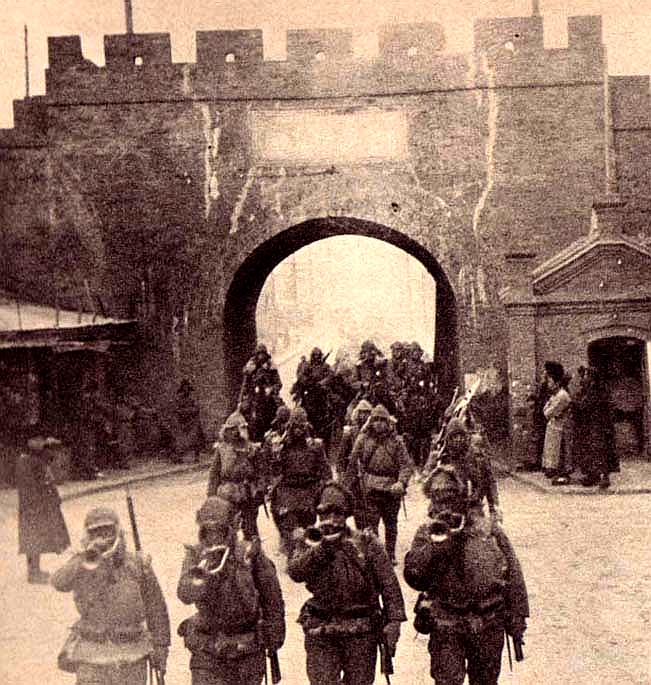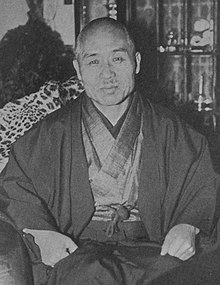
(Japanese troops entering Manchurian city, from wikimedia)
The location of the explosion was near the Chinese city of Mukden (now known as Shenyang) in Manchuria, the home of the Manchu dynasty which had ruled the country from 1644 to 1912. As the weakened China became the prey of Western powers and a resurgent Japan in the 19th century (which defeated China in a war during 1894-5 over control of Korea), Manchuria became the focus of ambition by the rapidly expanding Russian Empire and Japan.
Their competition led to the Russo-Japanese War of 1904-5, which began with a surprise attack by Japan on the Russian Far East Fleet based at Port Arthur (now Dalian) in Manchuria. Just as with the attack on Pearl Harbor 37 years later, the Japanese Declaration of War was delivered after the attack was underway. The war was a humiliating defeat for Russia. Japan received recognition that Korea was within its sphere of influence (and it annexed the country in 1910), took over the Port Arthur naval base and was ceded the authority to operate railroads throughout Manchuria. As part of the settlement, Japan had a large and growing military presence in the province.
For Japan, World War One was a good war. It joined the Allied side and ended up obtaining the previously German occupied Shantung peninsula in China, as well as several island chains in the central Pacific. Following the war, the navy sought parity with the fleets of the United States and Britain, but was thwarted in its efforts. Internally, the civilian governments lost political control of the country to the military factions which were increasingly determined to embark on accelerated expansion in Asia, with China as the prime target, and Manchuria as the first step.
 (from wikimedia)
(from wikimedia)The explosion on September 18, was set by the Japanese military, allegedly by Lt Suemori Kawamoto, to create a provocation to take over the province. The specific origins of the plot remain murky. It is known that elements in the Kwantung Army were plotting to create an incident that could be used to justify a complete takeover of Manchuria, but the extent to which the army's commander, military chiefs back in Tokyo and the civilian government were aware in advance remain a source of controversy.
 (Shigeru Honjo, commander, Kwantung Army)
(Shigeru Honjo, commander, Kwantung Army)The following day, the Kwantung Army attacked the Chinese garrison at Mukden and quickly seized the city. By January 1932, all of Manchuria was under Japanese control. China's Nationalist government under Chiang Kai-Shek, distracted by rebellions, including by the communists, and hampered by its poorly equipped and trained forces was ineffective in putting up resistance.
Relations between the United States and Japan also suffered. On January 7, 1932 Secretary of State Henry Stimson issued the Stimson Doctrine under which the United States would not recognize any government established by the Japanese in Manchuria. In March a defiant Japan established the puppet state of Manchukuo, with the last emperor of China, Puyi, as its head of state.
 (Japan withdraws from the League, from pinterest)
(Japan withdraws from the League, from pinterest)In late 1932, the League of Nations condemned Japan's actions, prompting Japan to resign from the League in March 1933. Japan had begun its march to full scale war with China in 1937, the 1940 alliance with Germany and Italy and it's ill-fated decision to attack America. It was also the start of 14 years of horror for the population of Manchuria under the brutal Japanese occupation, which extended to testing biological weapons on the local populace.
No comments:
Post a Comment